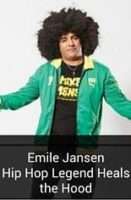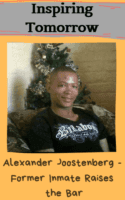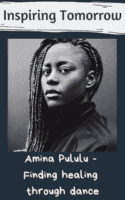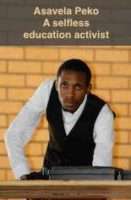People have over the years come to associate hip-hop with gangsters, due to its use of vulgar language and content. But veteran Emile YX? has been trying to alter that mentality by using hip-hop as a tool to address social ills.
Born Emile Jansen in Grassy Park in Cape Town, Emile YX? is now 47 and credited with creating the oldest, still-active, hip-hop crew in South Africa, back in 1988. It is the legendary Black Noise .
“I started breakdancing in 1982. Black Noise was one of the first breakdance crews. It was formed from the survivors of the breakdance era. Those influenced by the music of hip-hop hung together on weekends and started doing performances at malls, schools and carnivals. Very few people knew what hip-hop was about and it was hard work getting equipment and recordings done,” Emile YX? discloses in his book, Making a Black Noise, 2009.
Emile’s mom is a teacher and his dad a prominent soccer coach, having groomed former national team players such as Quinton Fortune. He has three siblings. Emile himself started stretching people’s minds two decades ago as a teacher.
“I’m a qualified teacher. I used to make black and white printouts that had hip-hop information and hand them to my pupils, but I left teaching in 1993 after I had been in it for three years. I was teaching the kids to stray from their callings, and go look for money and jobs. I wasn’t helping them discover their potentials but to rather follow the capitalism system. It didn’t sit well with me that I was paving them to that direction. So I poured all my energy and creativity into hip-hop.”
In case you think the ‘YX?’ is just another stunt to make his stage name sound fancy, he actually has a “conscious reason behind it”.
“In the 1990s when hip-hop started taking more of a conscious swing I changed my performance name to Emile YX? Because people were following the likes of [US revolutionary] Malcom X but were just randomly using the ‘X’. So I asked YX? (Why ‘x’?) I always felt it was necessary to ask questions,” he explains.
Black Noise dancers would spin on their heads with their bodies upside down – but their lives weren’t.
“We created the first hip-hop magazine in South Africa, called Da Juice Magazine. We created our own events to give our dancers a platform to share their talents because clubs wouldn’t let them perform. Wherever there was someone breakdancing we probably influenced that, cos our sense of focus was breakdancing.”
Outspoken Emile is a kind and ‘sweet’ person but he’s not the one to sugar-coat the truth. “I had lot of respect because I could speak my mind. Some guys would tell me, ‘Yhoaw, Emile you don’t give a damn bra.’ Simply cos their lives are tied up with the [music] industry. The industry was a joke and we wouldn’t encourage youngsters to join it; we focused on teaching them to do it for themselves.”
While he’s not encouraging artists to conform, Emile notes why some rappers never make their big break.
“The industry is not ready for raw hip-hop. It’s difficult to sell consciousness because music consumers might open their eyes and actually stop buying the music. Upliftment of community won’t sell. But a song about money and girls does. They’re selling advertisement space – not your music. Rappers aren’t honest. They don’t want to make the sacrifice.”
A firm believer in black consciousness ideology himself, Emile formed an NPO called ‘Heal the Hood’ (HtH).
“Heal the Hood started out as an informal, community-based, volunteer organisation by the youth, for the youth, on the Cape Flats. The purpose of our activities is to provide an alternative cultural experience for historically marginalised youth. Hip-hop and its related elements encourage youth to break away from the gangster culture encountered daily on the streets of the Cape Flats,” reads the organisation’s website.
One of their activities includes sending performers overseas. “We raised money to send people overseas and over time we have sent approximately 190 people. It was about giving young people that experience of touring and going overseas; it was one of the biggest things we did. It was to show them what they could do with hip-hop if they kept focused. I would have been a multimillionaire if I didn’t do that,” he says, jokingly.
Emile’s teaching background means he’s able to inject information into the youth’s minds, but via hip-hop style.
“In this country, we are injured historically and mentally. There are all these race groups and there is no attempt to be a South African. We were forced apart and you know in physics when a force is travelling in one direction you need an equal and opposite force to bring it to a stop,” he said in an interview with the Mail & Guardian newspaper on 07 May 2015.
After years of flying globally with the NPO, Emile landed the job of a judge for a national television dance show: ‘Step Up or Step Out’, on e.tv.
“I initially wasn’t interested in taking the job because I had already figured a way to survive without the help of the industry but people kept pestering me to take the job. ‘Take the job so you may inspire other Cape Flats kids’,” he says.
If the calls and messages of appreciation are anything to go by, he surely did inspire lot of dancers during the show’s duration. “Kids after the show would tell me that my advice was helpful and they’d try to implement them.”
However, there’s something about the industry that doesn’t sit well with him: “They edited the show beyond recognition. I was there to educate the dancers in the show and the ones at home, so I didn’t feel really good when they cut off most of the advice and kept the part where I say something like, ‘You look miserable’. They made me look like the bad judge and I even stopped watching the show cos it wasn’t a true reflection of what transpired,” he maintains.
After years of promoting social upliftment through hip-hop, Emile’s tireless contribution was finally rewarded.
“SA Hip-Hop Awards gave me an Honorary Award for my contribution and efforts, in 2014. They have, over the years, seen the work that I do. Here in Cape Town you put in the work but nobody recognises you, so I felt honoured when I received the award.”
Forget the music industry accolades – the greatest award that life ever gave Emile is his one-year-old son.
“That’s the most difficult but beautiful job I’ve ever done. I waited for a long time and at some point I wasn’t going to have any kids. He’s my contribution to the society, our manifestation of our love. My wife is Indian so he’s a mixture of South Africa and India. I feel more driven now that he’s around,” he says.
Emile and his wife may come from different religious backgrounds but he says it’s the differences that bring people together. “My wife is Hindu and my parents are Christians. If we all spoke about our diversity and embraced it, instead of focusing on our differences, then we’d be the most innovative place in the world. Imagine blending all our cultures – what we’d come up with? The world would constantly line up to see our Zulu dances fused with ballet dances, something the world hasn’t seen before.”
Visually, Emile is known for his distinctive, huge afro. Once there was debate around his hair, whether it was ‘real’. But growing his hair was, for him, more than just establishing a unique, trademark ‘look’.
“I grew my hair because I was away from home. When I returned, it was really huge. Most Africans are afraid to grow their hair because they’ll be labelled ‘kinky’. I said I wasn’t going to cut my hair … I wanted to break those racial barriers and have those debates. Some parents approach me now and say, ‘Emile, my kid wants to grow hair just like yours,’ and I know that’s a positive step away from the fear that we have as Africans.”
Emile is currently writing a book, “about my experiences, the struggle that Blacks go through to get heard.”
And his creative output doesn’t stop at music, dance and books: “There are people trying to do a documentary about me. Now we’re trying to raise money. We are going to shoot it in Sweden and some parts of the US. Now the next step is to visit US universities in an attempt to raise money to fund the documentary,” he says, adding that he’ll also be lecturing hip-hop at Stanford University in the US in 2017.
However, he says, “I’m not happy about spending much time overseas because I feel there’s still a lot to do here, at home.”
What advice does this veteran of the creative, consciousness-raising entertainment scene have? “One thing I can advise for our youth is that they must have a plan in life and execute it step-by step. If you want to become a billionaire then start by saving a rand today … step-by-step process will get you there,” he concludes.






